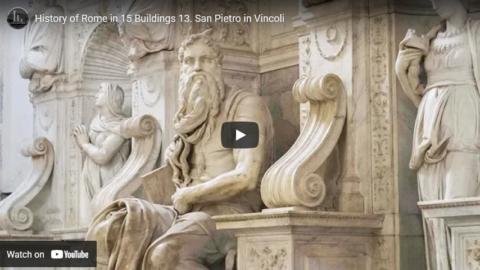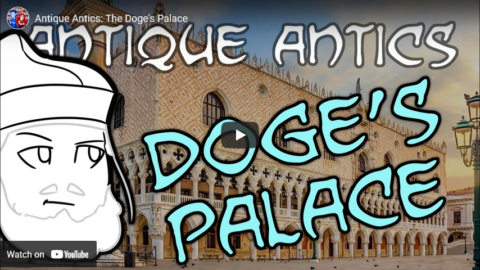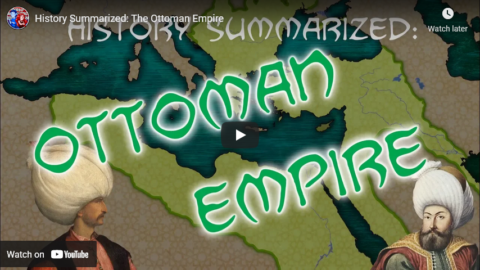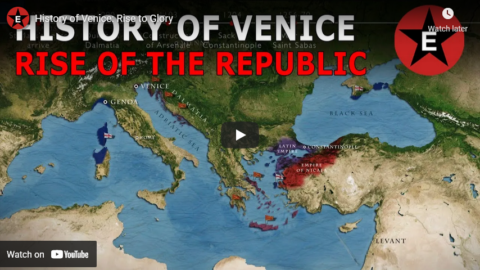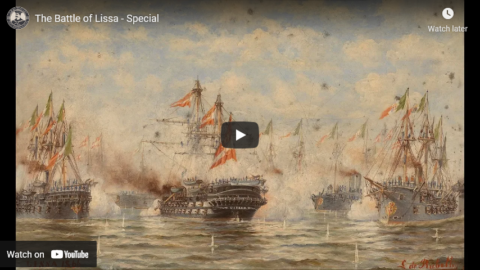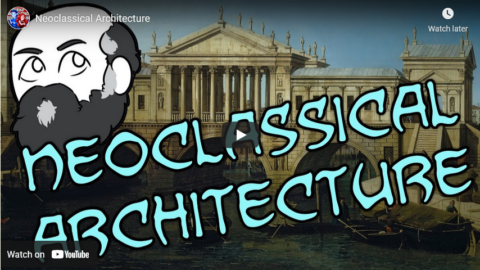Overly Sarcastic Productions
Published 29 Sept 2023The Byzantines (Blue’s Version) – a project that took an almost unfathomable amount of work and a catastrophic 120+ individual maps. I couldn’t be happier.
SOURCES & Further Reading:
“Byzantium” I, II, and III by John Julius Norwich, The Byzantine Republic: People and Power in New Rome by Anthony Kaldellis, The Alexiad by Anna Komnene, Osman’s Dream: The History of the Ottoman Empire by Caroline Finkel, Sicily: An Island at the Crossroads of History by John Julius Norwich, A History of Venice by John Julius Norwich. I also have a degree in classical civilization.Additionally, the most august of thanks to our the members of our discord community who kindly assisted me with so much fantastic supplemental information for the scripting and revision process: Jonny, Catia, and Chehrazad. Thank you for reading my nonsense, providing more details to add to my nonsense, and making this the best nonsense it can be.
(more…)
January 13, 2024
History RE-Summarized: The Byzantine Empire
February 21, 2023
Medieval Mardi Gras
Tasting History with Max Miller
Published 22 Feb 2022
(more…)
January 24, 2023
The Byzantine Empire: Part 9 – The Last Centuries
seangabb
Published 30 Dec 2022In this, the ninth in the series, Sean Gabb gives an overview of the last years of Byzantium, from the Crusader sack in 1204 to the Turkish capture in 1453.
Between 330 AD and 1453, Constantinople (modern Istanbul) was the capital of the Roman Empire, otherwise known as the Later Roman Empire, the Eastern Roman Empire, the Mediaeval Roman Empire, or the Byzantine Empire. For most of this time, it was the largest and richest city in Christendom. The territories of which it was the central capital enjoyed better protections of life, liberty and property, and a higher standard of living, than any other Christian territory, and usually compared favourably with the neighbouring and rival Islamic empires.
(more…)
December 10, 2022
The “Dark” Ages were fine, actually — History Hijinks
Overly Sarcastic Productions
Published 5 Aug 2022Curb your Crusading – the artwork, literature, and scholarship are far more interesting.
SOURCES & Further Reading: China: A History by John Keay, Byzantium & Sicily & Venice by John Julius Norwich, Great Courses Lecture series Foundations of Western Civilization by Thomas F. X. Noble lectures 27 through 38: “The Emergence of the Catholic Church”, “Christian Culture in Late Antiquity”, “Muhammad and Islam”, “The Birth of Byzantium”, “Barbarian Kingdoms in the West”, “The World of Charlemagne”, “The Carolingian Renaissance”, “The Expansion of Europe”, “The Chivalrous Society”, “Medieval Political Traditions I”, “Medieval Political Traditions II”, and “Scholastic Culture”.
(more…)
October 4, 2022
The History of the Wine Glass
Tasting History with Max Miller
Published 31 May 2022
(more…)
September 29, 2022
The History of Cyprus Explained in 10 minutes
Epimetheus
Published 24 May 2022The history of Cyprus explained from ancient times to modern.
(more…)
June 14, 2022
History of Rome in 15 Buildings 13. San Pietro in Vincoli
toldinstone
Published 2 Oct 2018Speech stands at the threshold of the compressed lips. Righteous indignation is written in the lines of the set jaw. The presence of God blazes forth from the eyes. As a work of art, Michelangelo’s Moses is nothing short of awe-inspiring. It sits, however, in the cramped central niche of a rather underwhelming wall tomb, ringed by smaller statues ranging in quality from mediocre to incompetent. This thirteenth episode in our History of Rome discusses the creation of the Moses, and the circumstances that brought it to the church of San Pietro in Vincoli.
To see the story and photo essay associated with this video, go to:
https://toldinstone.com/san-pietro-in…
May 27, 2022
The Crusades: Part 8 – The Rise of Venice
seangabb
Published 12 Mar 2021The Crusades are the defining event of the Middle Ages. They brought the very different civilisations of Western Europe, Byzantium and Islam into an extended period of both conflict and peaceful co-existence. Between January and March 2021, Sean Gabb explored this long encounter with his students. Here is one of his lectures. All student contributions have been removed.
(more…)
February 19, 2022
Antique Antics: The Doge’s Palace
Overly Sarcastic Productions
Published 5 Nov 2021To celebrate my marriage to my Darling Wife Cyan, I asked her to select this video’s topic. Now, given she chose Venice, I wonder who truly gave the gift to whom?
SOURCES & Further Reading: A History of Venice by John Julius Norwich, Francesco’s Venice by Francesco Da Mosto, Venice: City of Dreams from Rick Steves’ Europe, and perhaps literally the most fun source I’ve ever stumbled upon: a 17-page document from the actual Museum of the Doge’s Palace in Venice, explaining the history of the building and the collections inside. The bottom of their building-history webpage has a link to download the magnificent full-PDF, enjoy: https://palazzoducale.visitmuve.it/en…
Our content is intended for teenage audiences and up.
PATREON: https://www.Patreon.com/OSP
PODCAST: https://overlysarcasticpodcast.transi…
DISCORD: https://discord.gg/osp
MERCH LINKS: http://rdbl.co/osp
OUR WEBSITE: https://www.OverlySarcasticProductions.com
Find us on Twitter https://www.Twitter.com/OSPYouTube
Find us on Reddit https://www.Reddit.com/r/OSP/
January 5, 2022
History Summarized: The Ottoman Empire
Overly Sarcastic Productions
Published 5 Oct 2018Leave it to the furniture boys to pioneer a Comfort-First attitude towards Imperialism.
Join Blue in investigating the history of the Ottoman empire, and find out why “The Sick Man of Europe” is more than their nickname implies.
Further reading: Osman’s Dream by Caroline Finkel
Famous Turkish Song — Gunduz Gece: https://www.youtube.com/watch?v=2UcbH…
PATREON: www.patreon.com/OSP
MERCH LINKS:
Shirts – https://overlysarcasticproducts.threa…
All the other stuff – http://www.cafepress.com/OverlySarcas…Find us on Twitter @OSPYouTube!
November 25, 2021
History of Venice: Rise to Glory
Epic History TV
Published 14 Dec 2018Listen to or download the music HERE: smarturl.it/epichistoryvenice
Music by https://www.musicdesigngroup.comThanks to Elias Tsiantas for the 3D Venetian galley footage
Thanks to Miłek Jakubiec for the Battle of Marignano imageSupport the channel & get exclusive previews at Patreon:
https://www.patreon.com/epichistorytvWant to learn more? We recommend A History of Venice by the late John Julius Norwich, a great popular historian on all things Mediterranean (as an Amazon Associate I earn from qualifying purchases): http://geni.us/7q71zx
#EpicHistoryTV #HistoryofVenice
October 23, 2021
The English Statute of Monopolies gets far more credit than it actually deserves
The Statute of Monopolies (1624) is often said to have been critical in helping to start England on the road to the Industrial Revolution, but in the latest Age of Invention newsletter Anton Howes argues it is far more complicated than it seems:
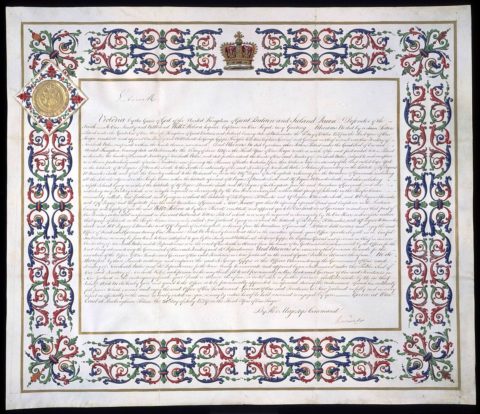
Letters Patent Issued by Queen Victoria, 1839. On 15 June 1839 Captain William Hobson was officially appointed by Queen Victoria to be Lieutenant Governor General of New Zealand. Hobson (1792 – 1842) was thus the first Governor of New Zealand.
Constitutional Records group of Archives NZ via Wikimedia Commons.
One of the most frequently mentioned landmarks in the history of intellectual property is the Statute of Monopolies, passed by the English parliament in 1624. I’ve often seen it lauded as the beginning of the system of patents for invention, or the first patent law. I remember giving a talk a few years ago where I downplayed the role of formal institutions in encouraging the Industrial Revolution, prompting an outraged economist in the audience to point to the law as a sort of gotcha — “here’s a better explanation: with patents you incentivise invention, and the Brits had just invented patents”.
Which is all to illustrate that the Statute of Monopolies is often fundamentally misunderstood. So what, exactly, did it actually do? It’s a tale of opportunism, corruption, and court intrigue, with some actual innovation inbetween. The whole saga ended Francis Bacon’s political career, led to a major constitutional crisis, and set the scene for how inventors were to behave and act for well over a century. In this first part, I’ll give the context you’ll need to really appreciate what was going on, and I’ll publish the rest in the weeks to come.
First off, the Statute of Monopolies was certainly not the first patent law. Venice’s senate had enacted a law on monopolies for invention as early as 1474. But even then, we shouldn’t be looking for statutes at all. The history of patents does not begin in 1474, but much earlier, with plenty of monopolies over new inventions having already been granted by the ruling grand council of Venice, and by the authorities of other Italian cities like Florence. The key thing to recognise about early patents is that they were not a creation of parliaments or their statutes, but of those in charge. They were the creation of sovereigns, a creature of kings and queens (or in the case of republics like Venice, of governing councils).
As regular readers of this newsletter might remember, patent monopolies for invention had already had long history in England, well before 1624. Patents in general were a very ordinary tool of English monarchs, used to communicate their will. By issuing letters patent, monarchs essentially issued public orders, open for everyone to see. (Think “patently”, as in clearly or obvious, which comes from the same root.) Monarchs used letters patent to grant titles and lands, appoint or remove people as officials, extend royal protections to foreign immigrants, incorporate cities, guilds, even theatre troupes — in general, just to rule.
And, eventually, English monarchs copied the Venetians by issuing letters patent to grant temporary monopolies to particular people, to encourage them to make discoveries, publish books, or introduce new industries or inventions to the realm. It’s only over the passage of centuries that we’ve come to refer to patents for invention — a mere subset of letters patent, and really even a mere subset of patent monopolies for all sorts of other creative work — as simply patents. Intellectual property was thus a ruler-granted privilege, created in the same way that a town gains the official status of a city, or a commoner becomes a knight. English monarchs began granting monopolies for discovering new territories and trade routes from 1496, for printing certain books from 1512, and for introducing new industries or inventions from 1552 (with one weird isolated exception from as early as 1449).
September 17, 2021
The Battle of Lissa, 1866
Drachinifel
Published 26 Sep 2018One of the most unintentionally hilarious battles of the 19th century is the subject of today’s special video.
“Bezeuge Mich!” – Admiral Tegethoff 1866 (probably)
August 14, 2021
English wholesalers, Dutch retailers and the expansion of foreign trade by European sailors
In the latest Age of Invention newsletter, Anton Howes considers the changing nature of English foreign trade as possibly one of the main drivers of the unprecedented growth of London from 1550-1650, and how both English and Dutch sailors differed from most of the rest of Europe:
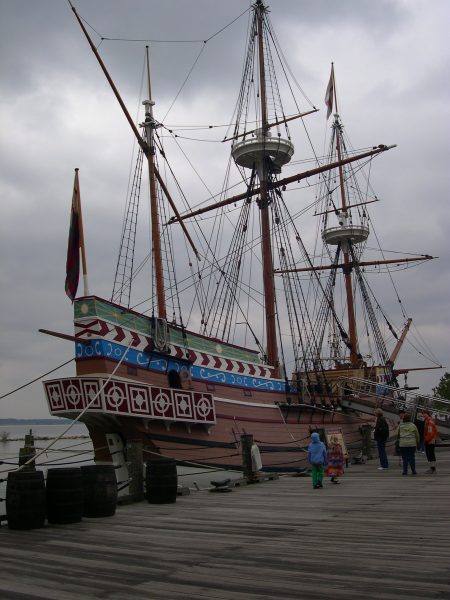
An English merchant ship of the late 16th to early 17th century: this is a replica of the Susan Constant at the Jamestown Settlement in Virginia. The original ship was built sometime before 1607 and rented by the Virginia Company of London to transport the original settlers to Jamestown.
Photo by Nicholas Russon, March 2004.
I am fairly convinced that this transformation was sparked by the changing nature of England’s trade, with its merchants taking near-total control of it themselves, whereas once they had relied on foreign merchants to bring many of their imports to them. And thanks to their adoption of celestial navigation techniques from the Iberians and Italians — learning to read the stars, to find their latitude at sea — the English gained the ability to discover new routes, noting details down for others to come back again and again and create more permanent new trades. In merchants’ parlance of the time, the English increasingly went in search of “the well head” — to buy things at source, where they were cheapest.
This sounds like the common-sense thing to do. But it was surprisingly rare. Very few countries’ merchants attempted to take advantage of such opportunities for arbitrage — to buy where things were cheapest and sell them where they were most expensive. Even the English themselves, despite their newfound search for well heads, rarely exploited arbitrage opportunities to the full. Although they bought at source, they tended, at first, to sell the goods they’d acquired back in London, to serve English consumers rather than taking them to wherever the goods would sell for the highest prices. This was instead the strategy of the Dutch, whose trading techniques were by 1600 said to surpass all others. Indeed, the Dutch were also some of the only merchants who discriminated on prices within markers, “not shaming to retail any commodity by small parts and parcels”, as one English merchant complained, charging a multitude of buyers according to what they thought they could get from them — something that “both English merchants and Italians disdain to do in any country whatsoever.” It was seemingly considered beneath them.
I’m not wholly clear why the English only sold wholesale when they knew that price discrimination was a Dutch advantage. It seems, at first, to be irrational. But I suspect it had something to do with the wider difficulties of trading abroad. For the English and Dutch were quite unusual in Europe in the early seventeenth century for being among the only merchants willing to risk sailing to shores where their own rulers held no sway.
The Hanseatic merchants of the North Sea and Baltic, who had once been dominant in London, had been stripped of their privileges there and displaced by the English, later confining themselves largely to the Baltic. German mercantile efforts were otherwise generally concentrated inland. And French merchants were apparently under-capitalised, or so the English suspected, because “gentlemen do not meddle with traffic, because they think such traffic ignoble and base”. French merchants did occasionally sail down the Atlantic coast to Spain, and into the Mediterranean to trade with Italy and the Ottoman Empire, but overall they were content to have third parties to come to them — there was always the attraction to foreign merchants of being able to buy French wines, salt, linens, and grain.
As for the once-great Italians, they had apparently been impoverished by the Portuguese discovery of a direct route around Africa to the Indian Ocean, and perhaps by the depredations of various Mediterranean predators too — Algerian corsairs, Ottoman galleys, and the like. Although their rulers could themselves be merchants — the Grand Duke of Tuscany, a Medici, was considered the greatest merchant of them all — by this stage the Italians only rarely ventured far abroad themselves, except over land. Indeed, the English considered them impious for not risking the seas, accusing them of blasphemy for not trusting their lives and livelihoods to God. Whereas the Venetian merchant-nobility had once been required to spend time aboard ship, English commentators by 1600 noticed that their mariners were now overwhelmingly Greek. “Their customs have decayed, their ships rotted and their mariners, the pride of their commonwealth all become poltrones” — that is, loafers or idlers — “and the worst accounted in all those seas”. A Tuscan exploration of the coast of South America in 1608, to look into founding a colony in what is now French Guiana, had to be captained and piloted by Englishmen. What reputation the Italians maintained was as financiers and money-exchangers — perhaps because the Genoese were the only merchants permitted to take the vast quantities of New World silver out of Spain.
April 17, 2021
Neoclassical Architecture
Overly Sarcastic Productions
Published 16 Apr 2021You asked, I deliver: the Neoclassicism tangent receives the full-video spotlight it deserves. But there’s plenty more architectural and art-historical analysis where that came from. So if this kind of thing seems fun, please comment and let me know!
SOURCES & Further Reading: Francesco’s Venice by Francesco Da Mosto, A History of Venice by John Julius Norwich, “Renaissance Architecture” via Britannica, and many many many hours spent staring at buildings in Italy.
This video was edited by Sophia Ricciardi AKA “Indigo”. https://www.sophiakricci.com/
Our content is intended for teenage audiences and up.
PATREON: https://www.Patreon.com/OSP
PODCAST: https://overlysarcasticpodcast.transi…
DISCORD: https://discord.gg/osp
MERCH LINKS: http://rdbl.co/osp
OUR WEBSITE: https://www.OverlySarcasticProductions.com
Find us on Twitter https://www.Twitter.com/OSPYouTube
Find us on Reddit https://www.Reddit.com/r/OSP/

